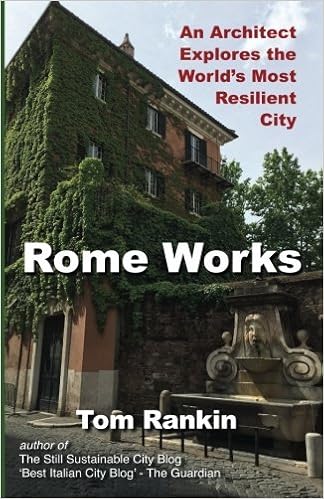Across the Atlantic
This summer I was back in the USA, vacationing on the Rhode Island coast, at a place very different from Rome. To many, this is a natural paradise. A rocky coastline with just a few scattered vacation homes frames some uncrowded sandy beaches. Produce stands sell locally grown corn and squash. Fishermen (and women) bring in boatloads of blues and bonitas each morning. Most of the architecture respects local traditions, uses local materials and has a pretty direct connection to its natural environment.
Yet something felt wrong. In order for the artifice of pristine nature to be maintained, massive quantities of energy are expended constantly. For every acre of productive farm there are hundreds of carefully manicured but essentially useless lawns, posing as natural but really neither part of a true coastal ecosystem nor used by a true human community. I can’t help feeling that each of these beautiful shingle-style houses, empty much of the year, exists because of a tenuous link to the real world beyond. SUVs head off to distant supermarkets to stock up on drinking water in plastic bottles because the local water table has been contaminated, (stopping for lattes and croissants at literally a dozen newly opened cafes along the way). Electricity and gas produced at a comfortably invisible distance keep life comfortable, and solid waste is trucked off regularly, out of site, out of mind. Whereas a generation ago you could still come down from Boston and stay for a whole vacation without needing a car (a general store at within walking distance at Sakonnet Point provided essentials like milk, bread and penny candy) now car trips to the mall are almost as frequent as walks to the beach.
I imagine what this place would be like when, fueled by climate change or thoughtful design — probably a combination of the two — a more sustainable human occupation of this natural paradise is instituted. Instead of evenly-spaced, over-sized mansions surrounded by picturesque but under-used “gardens” a couple of dense but small urban centers would host year-round and summer residents. At Sakonnet Point, the end of the peninsula, would be a vibrant coastal center with homes, shops, businesses, and rich cultural, natural and athletic opportunities all within walking distance. An electric train would connect this town to the Boston/Providence line and public boat service would cross frequently to Newport and other ports, eliminating the need for most private vehicles. Several other dense villages of 5-10,000 inhabitants would evolve around historic clusters in places like Little Compton Commons, Tiverton Four Corners, also served by the train line. Energy for these centers would be generated through solar, wind, and tide mills and connected to distributed networks. Local organic farms would provide almost all the food for these communities but instead of selling it at farm stands along the road they would bring their produce into town and sell it in farmers markets. Existing roads would remain for rare deliveries, emergency vehicles and ceremonial use (think classic automobile exhibitions, which in the future will include not just Model T’s but nostalgic Chevy minivans and Jeep Cherokees on display!) but they could be much narrower, require less maintenance due to reduced traffic, and augmented by highly-maintained bike paths. From any of the urban centers along the peninsula a 15 minute walk would take you to open countryside and a 30-minute bike or train ride through restored nature to another urban mini-center. As to what happens to the homes that litter the landscape today, I’m afraid that while some may be preserved and find second lives as special wilderness retreats, in my post-petroleum scenario most have little future beyond providing materials, to be dismantled and reconstructed in more sustainable locations.
Like so many eco-utopian fantasies, the place I envision combines elements of traditional (pre-petroleum age) communities like New England whaling villages with futuristic ones. Nantucket meets Naboo. What makes such places magical should not be watered down (as I’ve witnessed over the past few decades) but rather intensified, miniaturized and “complexified”. New England could learn from its own past but also from the example of the Italian hill-town surrounded by vineyards.
Image: Round Pond, Little Compton RI © photo: Tom Rankin


